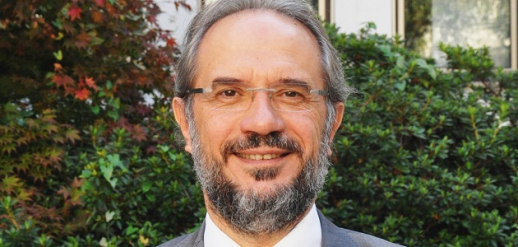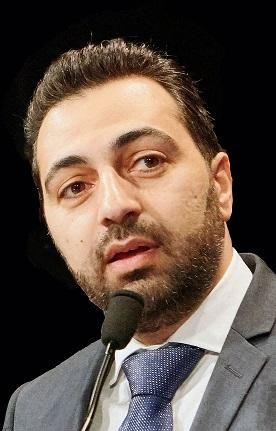News

But what happens to them? Afton Verrecchia agile coach teaches us more about the importance of politics in business

Afton Verrecchia, agile coach and leader in change management, gives us her feedback on the professional world she meets. In this interview she shows us how continuing education or politics can make us progress or block us in our career.
Hello Afton. Why did you choose computer science as your studies and why did you choose the EPITA school?
Afton Verrecchia : In 2007, the Subprime crisis in the United States which was supposed to impact only this country finally spread to the whole world. There was a fear about the future and particularly in the field of employment. Also, I chose to find an educational sector promising me a job that would not experience the “crisis”.
In France we are not guided enough in our career choices. We let too many young people move towards fields which have few outlets because they are already in high demand (psychology, marketing, etc.) or which sort things out very late (legal fields). These courses force young graduates to accept low salaries or prevent them from practicing in the field studied because of the limited number of places.
Not being yet sure of the job towards which to direct me after my studies, an engineering school guaranteed me to postpone this decision somewhat.
In the end, my choice fell on computers. IT is a very vast field allowing to specialize in extremely varied sectors (networks, project management, embedded systems, artificial intelligence, research etc) but also allowing to work in particularly heterogeneous business sectors (health, finance , media, industry etc).
Finally, why EPITA? Discovered at a student fair among other engineering schools, EPITA was already approved by the CTI, which was a determining factor for my choice. Two other parameters reinforced and motivated me in my choice of school. On the one hand, EPITA was presented to me as being a difficult school, in particular with the famous swimming pool, and I consider that when something is difficult to obtain, it gives more flavor to the result.
On the other hand, the particularly low number of women in IT piqued my curiosity and I was ready to take up the challenge and increase the percentage of women in IT.
What are your academic choices at EPITA that help you today in your work?
Afton Verrecchia : I chose the Major GITM (Global IT Management). This major has benefited me for two main reasons. On the one hand, it was taught entirely in English with students from international exchange programs, which allowed an important cultural openness and a practice of English necessary in the professional context. On the other hand, some of the courses offered have brought me a lot for my professional skills.
The Crossboarder Management courses prepared me to manage the projects that I had to manage with teams from different countries.
The technical courses provided allowed me to maintain the necessary expertise to work in the IT field.
Finally, the Change Management courses, which I particularly liked, allowed me to discover the job I have been doing for the past four years.
I could really see how important it was in any project to bring together the right people at the right time, but also the right change management plan. All too often, the support phase towards change is underestimated and can directly impact the success of the project.
What are your professional experiences that led you to achieve your professional career?
Afton Verrecchia : My professional career is far from over, it is constantly evolving.
I started by being a consultant in ESN. These companies are perfect to start when we do not have much experience or networks. They allow us to access various missions for prestigious clients and thus put big company names on our CVs.
For 7 years, I was therefore able to regularly change missions and clients while varying the environments in which I worked. These experiences allowed me to constantly challenge my skills and push myself out of my comfort zone.
Looking back, I realize that by going directly to an end customer after school, I might not have had the same progress or the same learning prospects.
Working in an ESN requires us to have greater autonomy and a long-term vision of what we want for our professional career. Our development prospects will not necessarily be in line with the interests of our ESN or the client with whom we will be working.
Whether looking for a new job or a new mission in an ESN, you have to be very attentive to the opportunities that may present themselves to you. It is necessary not to accept everything and anything, especially if it is not consistent with the professional path that one wishes to pursue.
We often talk about a professional project, but how do we determine it when we start out in the world of work?
Afton Verrecchia : I would say that it is people, encounters, exchanges, experiences and mistakes that allow you to make an informed choice about your career. We have the right to be wrong, we just have to know how to recognize it and change paths. It is good to have long-term goals, but it is very important to have short-term ones and not to project yourself too far because the future is uncertain. You have to keep an agile mentality and think about your professional situation for two or three years then iterate each year, think about the skills you want to acquire and how to achieve them.
There is no point in rushing in your career choices, you can change your goals throughout your career, things can also settle down and take the expected path when you least expect it. If an experience is interesting and offers new knowledge or skills, you have to know how to stay open even if it was not the position initially targeted.
To what extent does self-training pay off in professional progression? And how do you access these courses?
Afton Verrecchia : Continuous training is essential! Never stop learning. When we left school, we were told that we were obsolete after 5 years. With my experience I have the impression that it is even faster today. It is therefore important to stay tuned to new developments, to continue to monitor and be a pioneer.
As part of our work, we will have access to training that will serve the interests of the company. The company does not make us do training for our own professional development, it is then up to us to be proactive and think about the training courses that are in line with our career objectives.
In-company training today is ultimately used to validate knowledge acquired through practice. They will therefore never replace good experiences in our professional field.
Why do you need to develop your sense of politics and what is the impact of politics on your career, especially at the start?
Afton Verrecchia : You don't evolve "alone" in your career, so you don't evolve without doing politics. Not taking it into account creates a lot of frustration, a feeling of injustice and wastes a lot of time.
For example “Why this colleague who is less competent than me was able to obtain such a role / such a promotion?”. The answer will often be “politics”. This colleague was surely able to communicate better about his work and better highlight it, he was also more comfortable in relation to his other colleagues and his hierarchy.
However, we must not resign ourselves, we must learn to play it. We try, we fail, we learn, we try again.
You will meet people who “only” do business politics, who use the work of others and know how to sell it better than them. In my opinion, you have to know how to be smart, and opportunistic: have confidence in yourself, in your skills, and dare things. We waste so much time getting in the way of ourselves. You have to learn to defend your work, to communicate it.
We neglect the weight of politics in business. There are people who are even allergic to it and who refuse to do it, but unfortunately this can be done to the detriment of their evolution. We are all obliged at our level to play politics. Politics is not about changing our behavior to match what we want from us: We can keep our values and play politics. You just have to know how to define how to achieve your goals while respecting them. Politics is above all about alliances and opportunism.
Thanks to your hindsight and the many interviews you may have had or even done, what mistakes do you think should not be made?
Afton Verrecchia : The main mistake not to make is to underestimate yourself. Whether in terms of compensation, or in terms of knowledge / skills, never underestimate yourself! We talk about the impostor syndrome, that is to say thinking that we are not legitimate when we have the necessary skills. You will be given a whole host of reasons for not paying you the right price. It takes a long time to catch up on a pay gap. The stories of salary grids are for me a chimera: everything is negotiated.
And it's not just the salary that is negotiated, you can negotiate paid training, a position, titles...
You have to know how to make your hierarchy understand what you know, what you want and what you are worth.
It is also important not to accept positions or tasks that will not serve you for your career. Know how to say no! If something is not part of your objectives and does not allow you to acquire knowledge, skills or influence, you must know how to refuse it with diplomacy. Your hierarchy will not hesitate to ask you for more, especially if you work well. On the other hand, keep in mind that it is important to know how to get out of your comfort zone in order to acquire new, more complex skills that you can monetize. Everything is a question of balance.
Alongside this, a parameter that greatly influences our careers is company politics. Can you tell us more about this and what do we mean by this?
Afton Verrecchia : Politics is difficult to define simply. It's not tangible. These are certain rules that will vary depending on the context, people and companies. These rules are not disclosed to us from the start and will become apparent to us as we gain experience in the professional world. These rules teach us how to behave, who we should relate to and how we should communicate in different contexts.
When I left school, and like many people, I naively thought that you only had to work well to be rewarded and evolve in a company, but I realized that it was much more complex than that and it This is where politics comes in.
Policy can be seen as a presentation to an audience. Some people will focus on substance (technical skills) and find it difficult to convey what they are presenting, others will only focus on form (presenting well and adapting their speech to their audience) and will perhaps be listened to more. In reality, the content and the form are inseparable and to be understood you have to adapt to each of the people to whom you will present your project. Emotional intelligence tools exist to help you adapt your presentations or your speech to a person. I am thinking in particular of the DISC method which helps us to target the type of personality that we have in front of us in order to better convince it. Some people need extremely factual data to be convinced; on the contrary, other people will need us to go to the essentials without getting lost in the numbers.
This is where Soft Skills come in. Soft Skills are cross-cutting skills for each profession and include communication, how to be comfortable, non-verbal, how to behave, etc. . But here again these skills must be adapted to the circumstances and to the people.
Politics is knowing who to contact, when and how, it is also setting up alliances because alone you will not be able to obtain what you want, even if you have the best technical solution. Politics can turn situations around, speed up projects or slow them down. You can believe me if I tell you that you will very quickly hear “we are going to do it like that, because it is political”. Remember that the interests of the company are not necessarily the interests of your manager, which may still be different from your own interests.
To what extent does the annual interview have an impact on a career and when are the big decisions made?
Afton Verrecchia : Big decisions are made by you, by staying on the lookout for new opportunities, talking to people and knowing what you want. You have to know how to position yourself and not wait for everything to fall straight into your beak because less competent people will be able to position themselves before you on the opportunities you want.
We appreciate people who are daring, and sometimes managers don't want to rack their brains and take the one who has been able to come to them with the right support.
Once again we come back to politics. Working on your network is essential to be aware of opportunities. The annual interview is a mandatory interview, that does not mean that it is at this time that we negotiate everything: We negotiate when we want and when we can or when we have the cards in hand to do so.
All the times I was advised not to go too fast and I was told “I see that for you but in a few months”, it never happened. Conversely, when I made an alliance with the right people, things happened at an incredible speed. Positions can be created, we must not wait for things to happen, we must provoke them.
It is also necessary to think about gauging yourself in relation to the market and not only in relation to your company or its objectives. The market is constantly changing, not taking it into account is a big mistake in my opinion in terms of career.
Thank you very much Afton for this very enriching exchange.

 17
17













No comment
Log in to post comment. Log in.